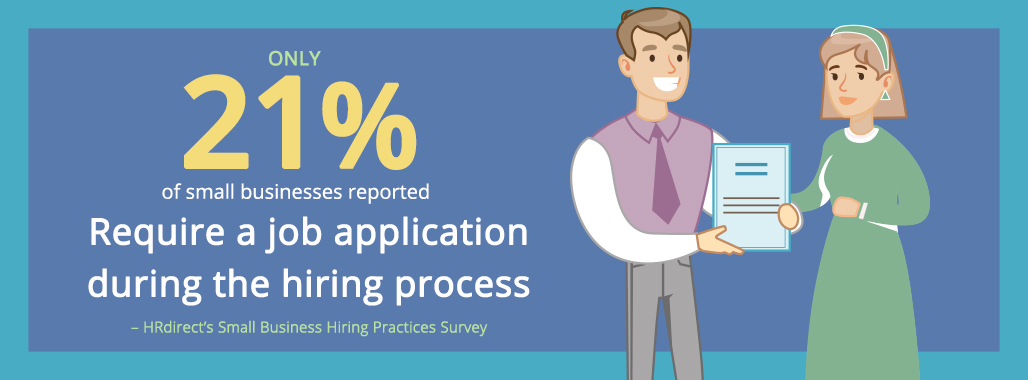Role of the Resume: Sell the Seeker
The resume is an applicant’s foot in the door. It’s his/her chance to shine and capture your attention, so you’ll only see what they’re willing to reveal — which is all the good stuff. The resume is more of sales tool for the candidate vs. a qualifying resource for you. When done well, a resume is an “at a glance” advertisement of the candidate, but it may not provide the nuggets you need to find the best of the best. The biggest challenge with resumes? They’re like fingerprints — no two are alike. They don’t follow a standard format, nor do they always hone in on all the information you need — such as references or reasons for leaving past jobs. When a resume leaves you with more questions than answers, it’s clearly time for something more: a solidly crafted job application.Application Advantage: Capture What You Need
Consider a job application as a resume gap filler. Job seekers use resumes to tell their stories, and they leave out the stuff they don’t want you to see. Though you’re not looking to catch applicants in a lie (although that sometimes happens!), you are hoping to fill in the blanks by asking questions a candidate may not divulge on a resume.

Basically, a job application puts you in control of gathering useful info. It should include employment history, educational background, skills/qualifications, and other pertinent details in a consistent, useful and compliant way. Curious about gaps in employment history? Go ahead and include a section requiring an explanation. Interested in learning about how a candidate thinks? Ask open-ended questions such as, What would your most recent supervisor say about you? or What were your biggest successes in your last role? Want to know more about their availability? Ask how long it takes to commute to your location, how many hours they are available weekly or what shifts they are open to. Instead of trying to read between the lines on resumes, your hiring managers can compare application answers from an entire pool of candidates in mere minutes for faster screening.
In addition, and maybe most important, a job application is a safety net for your business — it protects you through the inclusion of appropriate language and mandatory legal disclosures. It’s also an official document that reinforces vital, anti-discriminatory messages to protect your business from liability. For example, an attorney-approved job application will include language that you’re an equal opportunity employer, along with other federal and state legal notices (and restrictions, such as “ban the box” with criminal history).
Job applications provide tremendous value. You can confidently gather probing, job-related information regarding skills, employment and education without crossing into illegal territory.- Full Legal Name
- Email Address (instead of residential address)
- Phone Number(s)
- Preferred Name
- Military Service (acquired skills, dates of service)
- Years of Job-Related Experience
- Degrees and Institutions (specialties/majors/certifications)
- Job History & Skills Acquired
Target the Right Hires with Customized Job Applications
You can enhance hiring effectiveness by requiring both job applications and resumes. And, when your application is available online, you also expand your reach to many more candidates. With the Job Application Smart App, it’s easy to get started with job applications however you prefer, online or in person. Provide secure access to the job application on your company website or online ad, email the link directly to candidates, and print out unlimited copies.- Resumes serve the job applicant
- Job applications serve the employer
- Job applications let you capture consistent information for all applicants
- A carefully crafted job application provides legal protection
- You can easily begin accepting applications however you prefer: online or in person

